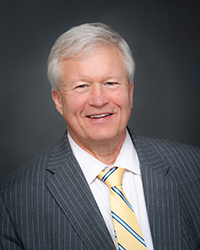 By Ted Shaw, President/CEO, Texas Hospital Association
By Ted Shaw, President/CEO, Texas Hospital Association
Next to our health care heroes, grocery store employees have been among the most visible of Texas’ frontline workers. They have earned a reputation for supporting the state during its most challenging and darkest days.
Amid the pandemic, a statewide stay at home order and the winter storm that rendered the state largely inert—without power and water and roads that were impassable due to snow, ice and fallen tree limbs, our essential workers continue to show up. They risk their health and wellbeing to keep the state running. And that risk is compounded by the fact that many essential workers would struggle to access and pay for health care services if they became ill or injured because they are uninsured.
About a quarter of grocery store workers in 11 Texas cities, including Amarillo, Arlington, Austin, Corpus Christi, Dallas, El Paso, Fort Worth, Houston, Irving, Lubbock and San Antonio, have no health insurance, according to a May 2020 Associated Press analysis of census data. But the 87th Texas Legislature could change that this session. The legislature can provide a path for low wage working Texans to access meaningful health care coverage.
At a Senate budget hearing last month, the Texas Health and Human Services Commission testified that the state could enroll 900,000 more Texans by expanding Medicaid eligibility to adults whose income is at or below 138% of the federal poverty level. That’s about $17,800 a year for a single person or $36,600 a year for a family of four.
A July 2020 report by the Center on Budget and Policy Priorities estimates that more than 650,000 of the nation’s uninsured essential workers, could gain health care coverage if holdout states widened their Medicaid eligibility requirements. For Texas, that means an estimated 226,000 of our essential workers could have health insurance.
Hospitals and health care providers across the state have long supported efforts to increase the number of Texans with affordable, comprehensive health care coverage. The benefits of health insurance are clear. When Texans can reliably get health care services they need, they can maintain and even improve their baseline health, which is essential to a strong, productive workforce.
There are compelling financial incentives for the state to pursue coverage expansion as well. The federal government has increased the amount of matching funds it is providing to states for Medicaid services through the duration of the public health emergency. And at the time of this writing, the U.S. Congress is considering a measure to further increase that amount by 5 percentage points for two years for holdout states that opt to expand Medicaid. The Center on Budget and Policy Priorities estimates the financial gain for Texas to be nearly $6 billion for the two years, the most of any non-expansion state.
Texas hospitals launched a statewide campaign to educate lawmakers, the public and other key stakeholders about health care coverage expansion. Now is the time to address the coverage gap in Texas. Providers see firsthand the positive impacts that health care coverage has on patient lives. Houston-area providers are encouraged to educate their members of the Texas Legislature on these benefits as well. We continue to rely on our essential workers, and they have again and again demonstrated their commitment not only to their employers but to the communities they serve. It’s time we pay it forward and support those who tirelessly support us.


